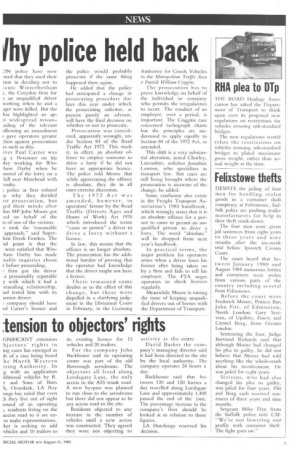ihy police held back
Page 7

If you've noticed an error in this article please click here to report it so we can fix it.
..)N police have now med that they used their tion in deciding not to :cute Winterbotharn
the Croydon firm for a an unqualified driver vorking when he and a sger were killed. But the has highlighted an apit widespread rnisunriding of the relevant ollowing an amendment gave operators greater :tion against prosecution es such as this.
iver Paul Carter was Lg a 16-tonner on his day working for Win:ham Darby when he ontrol of the lorry on a hill near Minehead with esults.
police at first refused ty why they decided ist prosecution, but de their minds after Ion MP John Moore got fed on behalf of the ts of one of the victims. e took the 'reasonable approach," said Superlent Derek Fowkes. The .ial point is that the were satisfied that Win:barn Darby has made nable inquiries about r before proceeding.
firm got the driver a presumably reputable y with which it had a standing relationship, lad tested him with its senior driver.
company should have ed Carter's licence and the police would probably prosecute if the same thing happened there again.
He added that the police had anticipated a change in prosecuting procedure due later this year under which the prosecuting solicitor, at present purely an advisor, will have the final decision on whether or riot to prosecute.
Prosecution was considered, apparently wrongly, under Section 84 of the Road Traffic Act 1972. This made it, in effect, an absolute offence to employ someone to drive a lorry if he did not have an appropriate licence. The police told Moore that while appreciating the offence is absolute, they do in all cases exercise discretion.
The 1972 Act was amended, however, in operators' favour by the Road Traffic (Drivers Ages and Hours of Work) Act 1976 which introduced the terms "cause or permit" a driver to drive a lorry without a licence.
In law, this means that the offence is no longer absolute. The prosecution has the additional burden of proving that the operator had knowledge that the driver might not have a licence.
There remained some doubts as to the effect of this change, but these were dispelled in a clarifying judgment in the Divisional Court in February, in the Licensing
Authority for Goods Vehicles in the Metropolitan Traffic Arra v Patrick William Coggins.
The prosecution has to prove knowledge on behalf of the individual or company who permits the irregularities to occur. The conduct of an employer, over a period, is important. The Coggins case concerned tachograph charts but the principles are understood to apply equally to Section 84 of the 1972 Act, as amended.
This shift is a very substantial alteration, noted Chorley, Lancashire, solicitor Jonathan Lawton, who specialises in transport law. But cases are still being brought where the prosecution is unaware of the change, he added.
Some confusion also exists in the Freight Transport Association's 1985 handbook, which wrongly states that it is an absolute offence for a person to cause or permit an unqualified person to drive a lorry. The word "absolute" will be dropped from next year's handbook.
In practical terms, the major problem for operators arises when a driver loses his licence after being taken on by a firm and fails to tell his employer. The FTA urges operators to check licences regularly.
Meanwhile Moore is raising the issue of keeping unqualified drivers out of lorries with the Department of Transport.




























































